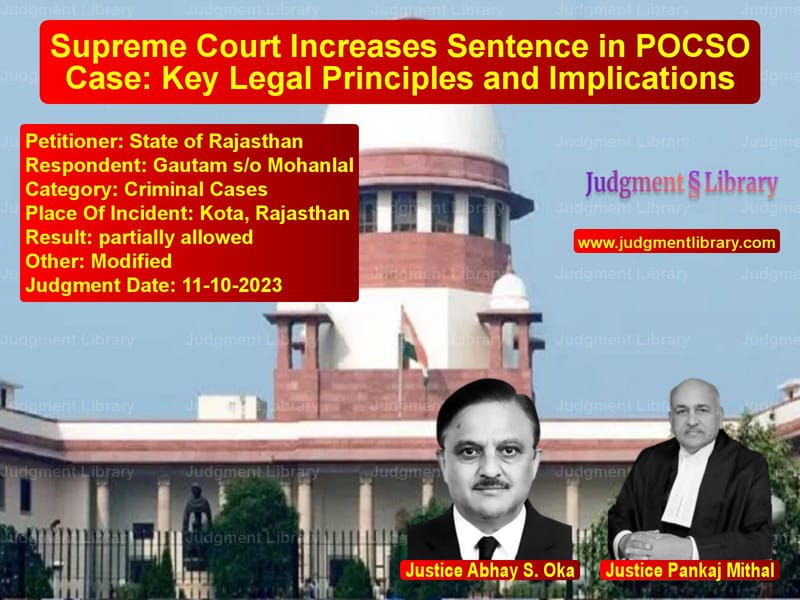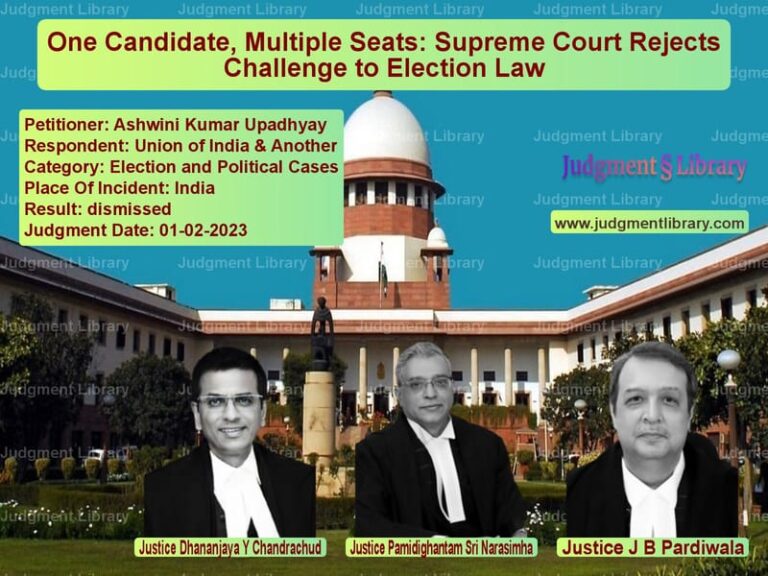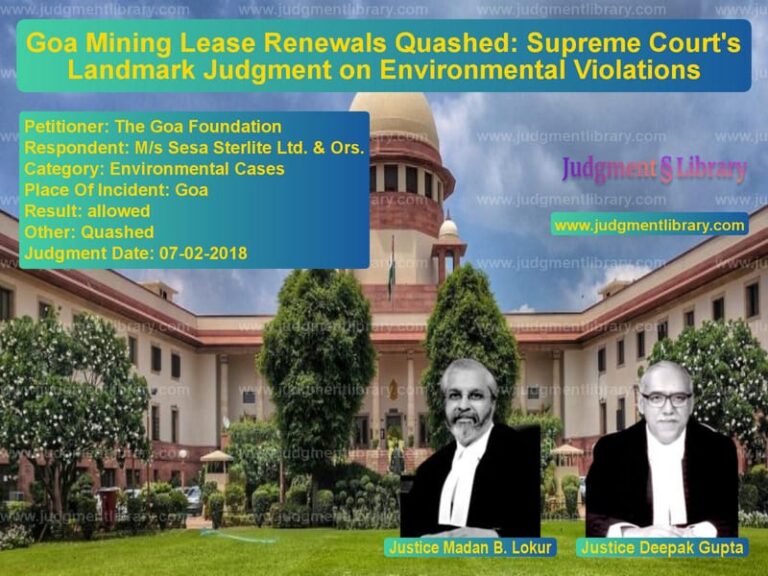Supreme Court Increases Sentence in POCSO Case: Key Legal Principles and Implications
The Supreme Court of India recently delivered a critical judgment in State of Rajasthan vs. Gautam s/o Mohanlal, addressing the quantum of sentence in a case involving the rape of a minor. This case, arising under the Protection of Children from Sexual Offences Act, 2012 (POCSO) and relevant sections of the Indian Penal Code (IPC), underscores the principles of proportional sentencing, judicial discretion, and child rights protection.
Background of the Case
The case involved a horrific incident of sexual assault against a five-year-old girl in Kota, Rajasthan, on May 8, 2014. The complainant, Rakesh (PW-3), filed a report stating that his daughter had been raped by the accused, Gautam s/o Mohanlal, a tenant living in the same building. The minor victim narrated the ordeal to her mother, leading to immediate medical examination and legal proceedings.
The accused was charged under:
- Sections 363, 342, 376(2)(i) and 376(2)(m) of IPC
- Sections 3 and 4 of POCSO Act
- Sections 8 and 10 of POCSO Act
Trial Court and High Court Rulings
The Trial Court convicted the accused and imposed the following sentences:
- Life imprisonment (remainder of natural life) under Section 376(2)(i) and 376(2)(m) IPC
- 10 years’ imprisonment under Section 377 IPC
- 3 years’ imprisonment under Section 8 of POCSO
- 5 years’ imprisonment under Section 10 of POCSO
- 6 months’ imprisonment under Section 342 IPC
- 3 years’ rigorous imprisonment under Section 363 IPC
The High Court, however, reduced the sentence for Section 376(2)(i) and 376(2)(m) IPC from life imprisonment to 12 years’ rigorous imprisonment, citing the young age of the accused and his socio-economic background.
Appeal to the Supreme Court
The State of Rajasthan challenged the High Court’s leniency, arguing that reducing the sentence was inappropriate given the severity of the crime. The accused, through amicus curiae, argued that he had already served a significant portion of his sentence and deserved leniency.
Supreme Court’s Key Observations
1. The Heinous Nature of the Crime
The Court emphasized the brutal impact of the crime on the young victim. The judgment stated:
“The offence is so gruesome and heinous that it will impact the victim for her entire life. The childhood of the victim has been destroyed. The victim’s life has been ruined due to the trauma and everlasting impact on her mind.”
2. Improper Consideration of Mitigating Factors
The Supreme Court found that the High Court had incorrectly considered mitigating factors such as the accused’s age (22 years), caste, and socio-economic background. The Court ruled:
“The caste of the accused is, per se, not a consideration for showing leniency in cases of such offences. The financial condition of an accused should not normally weigh in the mind of the Court when dealing with such a serious offence.”
3. The Doctrine of Proportional Sentencing
The Supreme Court held that punishment must be proportionate to the gravity of the crime. The judgment observed:
“If undue leniency is shown to the respondent in the facts of the case, it will undermine the common man’s confidence in the justice delivery system. The punishment must be commensurate with the gravity of the offence.”
Final Judgment
- The Supreme Court increased the sentence from 12 years to 14 years of rigorous imprisonment for offences under Section 376(2)(i) and 376(2)(m) IPC.
- The accused shall not be entitled to remission while undergoing the enhanced sentence.
- The remaining sentences for other offences remain unchanged.
- The fine of ₹25,000 imposed by the Trial Court was upheld, with ₹20,000 directed to be paid as compensation to the victim.
- The Rajasthan State Legal Services Authority was directed to ensure immediate compensation for the victim under the Victim Compensation Scheme.
Implications of the Judgment
This ruling reinforces several crucial legal principles:
- Judicial Consistency: Courts must impose proportionate punishment in cases of child sexual assault.
- Victim-Centric Justice: Compensation and rehabilitation of child victims are essential in POCSO cases.
- Sentencing as a Deterrent: The ruling ensures that leniency does not dilute the severity of punishment in crimes against minors.
Conclusion
The Supreme Court’s ruling in State of Rajasthan vs. Gautam s/o Mohanlal sets an essential precedent for sentencing in POCSO cases. By enhancing the punishment, the Court reaffirmed the importance of strict judicial scrutiny in crimes involving minors. The judgment ensures that child victims receive adequate justice, sending a strong message against leniency in such grave offences.
Petitioner Name: State of Rajasthan.Respondent Name: Gautam s/o Mohanlal.Judgment By: Justice Abhay S. Oka, Justice Pankaj Mithal.Place Of Incident: Kota, Rajasthan.Judgment Date: 11-10-2023.
Don’t miss out on the full details! Download the complete judgment in PDF format below and gain valuable insights instantly!
Download Judgment: state-of-rajasthan-vs-gautam-so-mohanlal-supreme-court-of-india-judgment-dated-11-10-2023.pdf
Directly Download Judgment: Directly download this Judgment
See all petitions in Custodial Deaths and Police Misconduct
See all petitions in Attempt to Murder Cases
See all petitions in Judgment by Abhay S. Oka
See all petitions in Judgment by Pankaj Mithal
See all petitions in partially allowed
See all petitions in Modified
See all petitions in supreme court of India judgments October 2023
See all petitions in 2023 judgments
See all posts in Criminal Cases Category
See all allowed petitions in Criminal Cases Category
See all Dismissed petitions in Criminal Cases Category
See all partially allowed petitions in Criminal Cases Category







